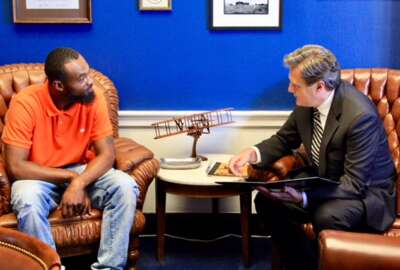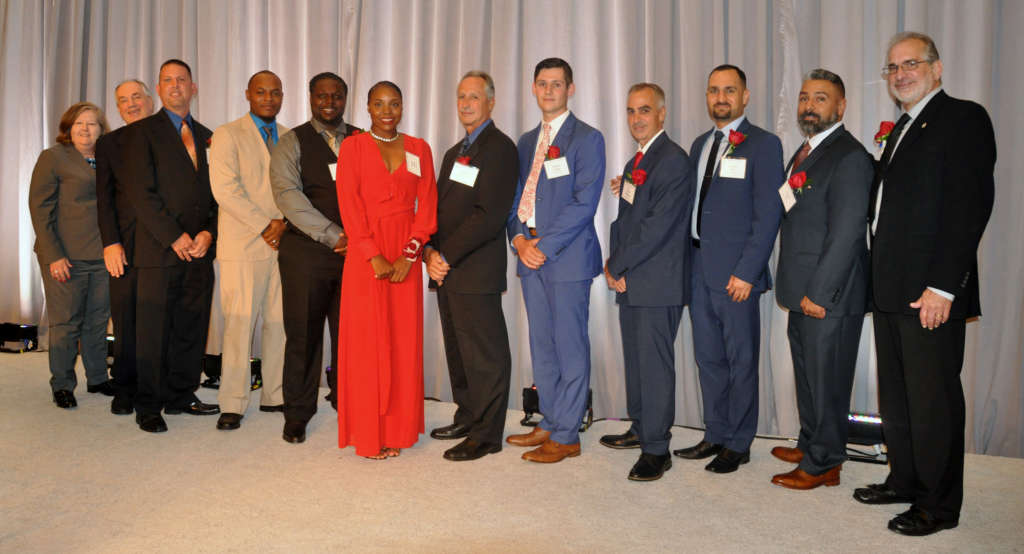
‘You do more than deliver the mail.’ Letter carriers praised for everyday acts of heroism
Stopping an armed burglar, bridging the language barrier for a woman seeking an ambulance and coordinating rescues for Texas residents in the aftermath of Hurri...
Stopping an armed burglar, bridging the language barrier for a woman seeking an ambulance and coordinating rescues for Texas residents in the aftermath of Hurricane Harvey make up just a few of the courageous acts that Postal Service letter carriers accomplished in the past year.
The National Association of Letter Carriers honored 10 of its letter carriers Wednesday, Sept. 26, for acts of heroism that helped save lives in the communities where they live and work. And in doing so, many of those letter carriers put themselves in harm’s way.
Fredric Rolando, NALC president, said letter carriers often respond to emergencies due to their familiarity with the neighborhood and the households on a near-daily basis.
“Because they’re out delivering the mail six or even seven days a week, in every community across this vast country, they’re often the first one on the scene when action is necessary,” Rolando said. “They do these things, not because they are supermen or superwomen, but because they know the neighborhoods they serve. They know when something’s not the way it should be.”

The Postal Service employs more than 113,000 members of the military and veterans, about a quarter of its letter carrier workforce.
“Letter carriers tend to deny that their actions were anything out of the ordinary, while adding that any of their colleagues would’ve done the same thing,” Rolando said.
Postmaster General Megan Brennan also praised the award recipients for going above and beyond.
“You do more than deliver mail. You represent the Postal Service, you care about your community, you live in these communities. Your selfless acts, your humanitarian efforts, deserve this recognition,” Brennan said.
Breaking down language barriers
Last August, Naseem Elias, a two-year letter carrier, helped a woman on his route in Sterling Heights, Michigan, contact emergency services when her infant child stopped breathing. Before Elias arrived on the scene, the woman, an immigrant from Egypt, had tried flagging down a passerby, but speaking in Arabic and limited English, the man ignored her and walked away.
“She knows that I speak her language,” Elias said. “So when she saw me, she yelled, ‘Please call the police. The baby isn’t breathing.’”
The letter carrier called 911, and stayed on the scene to translate for the mother and the first responders. The baby was treated and recovered at a local hospital.
“When a mailman speaks more than one language, it can help people,” Elias said.
In fact, he speaks six languages. In addition to English and Arabic, Elias knows Turkish, Kurdish, and two ancient Middle Eastern languages.
Raised in Iraq, Elias moved to the United States in 2009. Even barring emergencies, he regularly uses his extensive language skills to communicate with customers who questions about the mail, or what a letter signifies.
The Detroit metro area has one of the largest concentration Middle Eastern residents.
“Delivering the mail is not only putting letters in the mailbox, it’s about delivering to people news and needs, love and care,” Elias said.
‘We look out for the communities’
Last October, Peter Monteleone, a letter carrier in Mount Kisco, New York, came to the aid of a woman and her 12-year-old daughter after they found a burglar in their home.
“I hadn’t heard a scream like that,” Monteleone said. “It was total fear. It caught me off guard.”
When Monteleone responded to the scene, when he found the residents standing in the driveway of their home. He confronted the suspect, who he noticed had kitchen knives stuffed in his pants pocket, and prevented the suspect from leaving the scene.
Police who arrived on the scene said the suspect had also taken blank checks and jewelry from the household.
“We look out for the communities,” Monteleone said. “They become an extended part of our family, and we become an extended part of their family.”
Rescuing residents following Hurricane Harvey
Last August, Ebony Nobles, a city carrier assistant with only three months of experience under her belt, helped rescue dozens of Houston-area residents from their homes in the aftermath of Hurricane Harvey.
An Army veteran of the Afghanistan War, she worked with the volunteer “Cajun Navy” before the Army Reserves were activated, and arranged boat and helicopter rescues for neighbors and coworkers.
“It started expanding from there, because there was such a need,” Ebony said.
Once the Army Reserves were activated, Nobles played an active role in rescuing people from their flooded homes. In addition, she ran clothing and food drive for the community.
Ebony said she felt compelled to respond to the disaster in the city where she lives and works.
“You watch the devastation and you watch the utter defeat of some people that just give up. Your only reaction is to jump in and help. It’s what you can do and what you’re capable of,” she said. “I’m a city carrier, I’m a mom, I’m a soldier, and I’m a human being, and I have a heart. So all I did was reach out, using my heart and do what I could do.”
Copyright © 2024 Federal News Network. All rights reserved. This website is not intended for users located within the European Economic Area.
Jory Heckman is a reporter at Federal News Network covering U.S. Postal Service, IRS, big data and technology issues.
Follow @jheckmanWFED




